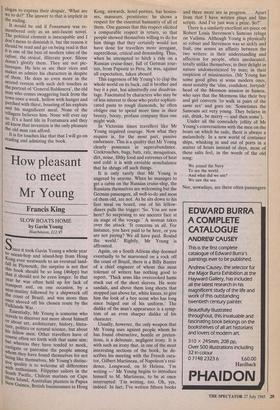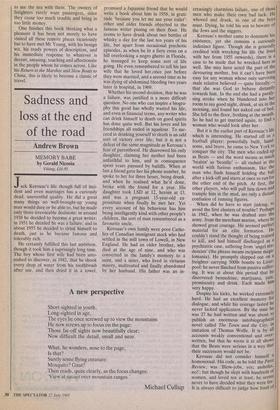How pleasant to meet Mr Young
Francis King
SLOW BOATS HOME by Gavin Young Hutchinson, 02.95 aft,
Since it took Gavin Young a whole year to ocean-hop and island-hop from Hong Kong ever westwards to an eventual land- fall in Plymouth, the surprise is not that this book should be so long (464pp) but that it should not be even longer. In that Year he was often held up for lack of transport and, on one occasion, by a near-mutiny followed by a shipwreck off the coast of Brazil, and was more than °nee shoved off his chosen route by the Falklands War. Essentially, Mr Young is someone who travels to discover not more about himself Or about art, architecture, history, litera- ti!re, politics or natural science, but about Ills fellow men. Other travellers have of course often set forth with that same aim; but .Whereas they have tended to mock, castigate or patronise the people among whom they have found themselves for not being like themselves, Mr Young's distinc- tive quality is to welcome all differences with enthusiasm. Filippino sailors in the South Pacific, Chilean marines on Cape Horn Island, Australian planters in Papua Mew Guinea, British businessmen in Hong
Kong, stewards, hotel porters, bar hostes- ses, masseurs, prostitutes: he shows a respect for the essential humanity of all of them. One guesses that this respect elicited a comparable respect in return, so that people showed themselves willing to do for him things that they certainly would not have done for travellers more arrogant, supercilious, critical and demanding. Thus, when he attempted to hitch a ride on a Russian cruise-liner, full of German tour- ists, from Papeete to Peru, he was, against all expectation, taken aboard.
This eagerness of Mr Young's to clap the whole world on its back, call it brother and buy it a pint, has admittedly one disadvan- tage. Fascinated by characters who may be of less interest to those who prefer sophisti- cated paste to rough diamonds, he often obliges one to spend more time in their breezy, boozy, profane company than one might wish. In Victorian times travellers like Mr Young required courage. Now what they require is, for the most part, passive endurance. This is a quality that Mr Young clearly possesses in superabundance. Cockroaches, bugs, bats, rats, mosquitoes, dirt, noise, filthy food and extremes of heat and cold: it is with enviable nonchalance that he shrugs off such things.
It is only rarely that Mr Young is angered by anyone. When he manages to get a cabin on the Russian cruise-ship, the Russians themselves are welcoming but the German passengers, all well-to-do and most of them old, are not. As he sits down to his first meal on board, one of his fellow- diners pulls the trigger: 'So. You are new here? So surprising to see anozzer face at zis stage of the voyage.' A woman takes over the attack: 'It concerns us all. For instance, you have paid to be here, or you are not paying? We all have paid. Round the world.' Rightly, Mr Young is affronted.
Again, on a South African ship doomed eventually to be marooned on a rock off the coast of Brazil, there is a Billy Bunter of a chief engineer of whom this most tolerant of writers has nothing good to report. 'Thick arms like overcooked hams stuck out of the short sleeves. He wore sandals, and above them long shorts that stopped just above fat, white knees, to give him the look of a boy scout who has long since bulged out of his uniform.' The dislike of the man's appearance is a symp- tom of an even sharper dislike of his character.
Usually, however, the only weapon that Mr Young uses against people whom he has found obstructive, hostile or preten- tious, is a debonair, negligent irony. It is with such an irony that, in one of the most interesting sections of the book, he de- scribes his meeting with the French cura- tor, Gilbert Martineau, of Napoleon's resi- dence, Longwood, on St Helena. 'I'm writing —' Mr Young begins to introduce himself to M. Martineau, to be at once interrupted: 'I'm writing, too. Oh, yes, indeed. In fact, I've written fifteen books and three more are in progress. . . Apart from that I have written plays and film scripts. And I've just won a prize. So?'
There is a similarly excellent set-piece on Robert Louis Stevenson's Samoan refuge on Vailima. Although Young is physically so robust and Stevenson was so sickly and frail, one senses an affinity between the two writers: in their understanding and affection for people, often uneducated, totally unlike themselves; in their delight in nature undomesticated by man; in their suspicion of missionaries. (Mr Young has some good gibes at some modern ones, most notably the 'slim, confident, fortyish' head of the Mormon mission in Samoa, who says that the Mormons like their boy and girl converts 'to walk in pairs of the same sex' and goes on: 'Sometimes the Samoans act very young. They believe in eat, drink, be merry — and then some').
Under all the comradely jollity of Mr Young's conversations with the men on the boats on which he sails, there is always a melancholy. In a new world of container ships, whisking in and out of ports in a matter of hours instead of days, most of these salts feel, in the words of the old song: We joined the Navy To see the world. And what did we see? We saw the sea.
Nor, nowadays, are there often passengers to see the sea with them. The owners of freighters rarely want passengers, since they cause too much trouble and bring in too little money.
One finishes this book thinking what a pleasure it has been not merely to have visited all these remote places vicariously but to have met Mr Young, with his benign wit, his ready powers of description, and his immediate response to whatever is decent, amusing, touching and affectionate in the people whom he comes across. Like his Return to the Marshes and Slow Boats to China, this is likely to become a classic of travel.















































 Previous page
Previous page